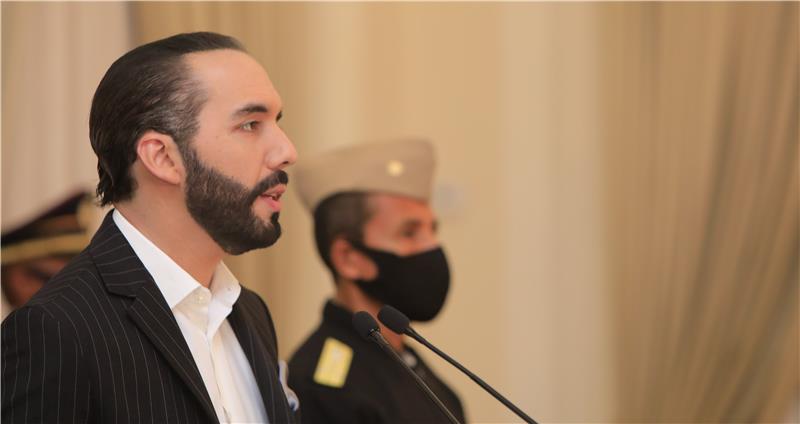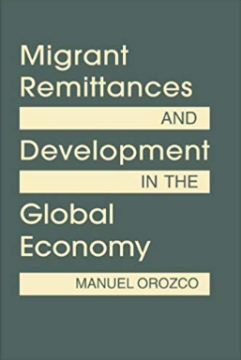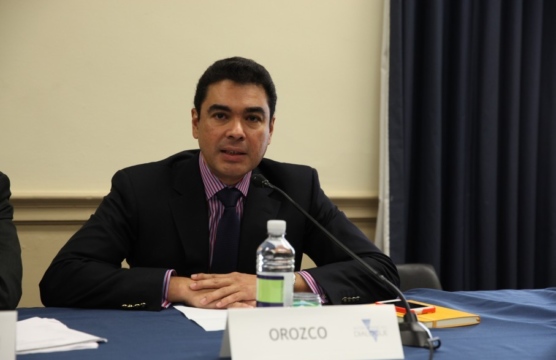The Earthquake’s Impact on Remittances
The earthquake in Haiti has exacerbated an existing distress during the international recession and increased uncertainty of what to do and how to help.
A Daily Publication of The Dialogue
El Salvador’s ruling party-controlled Legislative Assembly on June 8 passed a measure proposed by President Nayib Bukele to designate Bitcoin a legal tender, making the Central American nation the first in the world to do so. What are Bukele’s goals in making Bitcoin one of El Salvador’s official currencies, and what are the major benefits and drawbacks? What implications does the move have on remittance flows, anti-money laundering efforts and the U.S. dollar, which is El Salvador’s main currency? What potential consequences could formalizing the cryptocurrency have on the country’s program with the International Monetary Fund? What does the measure mean for businesses operating in El Salvador?
Julia Yansura, program manager for Latin America and the Caribbean at Global Financial Integrity: “El Salvador’s GDP contracted nearly 9 percent in 2020 during the Covid-19 crisis, and full recovery is not expected until 2023. Meanwhile, external debt is rising. In this difficult economic context, the country is trying to find solutions. President Bukele has said Bitcoin will promote financial inclusion, facilitate remittances and attract investment to the country. Some of these make more sense than others. It’s unlikely that Bitcoin, which is complex and volatile, will be a financial inclusion pathway for average Salvadorans who find existing options with banking, community credit unions or mobile money too complicated or costly. Moreover, for migrants sending remittances, Bitcoin is too complicated to be attractive. I do think the move will attract investment to El Salvador, but not without significant risks. While El Salvador’s security situation has improved somewhat, the country remains vulnerable to organized crime and drug trafficking. El Salvador will need to be extremely careful to avoid the wrong types of investment. Attracting international tech entrepreneurs is one thing; attracting international money launderers or tax evaders is another. If things go wrong, the Bitcoin experiment could be very costly to the country’s security as well as its image, causing other investors, businesses and financial institutions to perceive heightened AML/CFT risks, particularly at the Bitcoin-to-dollar conversion point. As the country updates its regulatory framework in preparation for Bitcoin, it would do well to evaluate its overall AML/CFT system and address existing weaknesses in light of the big changes that lie ahead.”
Helen Harris, senior research associate at McLarty Associates: “By designating Bitcoin as legal tender in El Salvador, President Bukele seeks to increase financial penetration, while eliminating transaction fees on remittances—which account for 20-25 percent of GDP. President Bukele also argues that it would foster investment and boost employment, primarily if El Salvador becomes a hub for Bitcoin mining, a strategy that raises skepticism and is criticized by environmentalists. While the country is moving forward with the implementation of a bimonetary system with the cryptocurrency and the U.S. dollar, the enforcement of this design is not clear. The government has declared it will guarantee Bitcoin convertibility to the U.S. dollar, but given Bitcoin’s volatility, there are doubts whether El Salvador has the necessary funds. There are additional consequences to the adoption of a decentralized cryptocurrency, such as the negative impact it may have on the country’s anti-money laundering efforts. Should El Salvador become a haven for money laundering, it will most likely see its $1 billion negotiation with the IMF become compromised. In addition to fiscal concerns, there are also implications for multinational firms doing business in El Salvador. Should headquarters consider Bitcoin a foreign currency, or should it remain regulated as a commodity? How will international tax treaties and financial regulations address cryptocurrencies once they become legal tender? These are all issues that regulators will now have to consider, as Salvadorans assess whether they want to embrace Bitcoin as their currency or merely use it with the final goal of exchanging for U.S. dollars.”
Tim Jacklich, senior analyst at Americas Market Intelligence: “President Bukele presents the recognition of Bitcoin as legal tender in El Salvador as a groundbreaking step for financial development and inclusion. Upon a closer look, this policy is a risky gambit, likely offering some benefits but also exposing the Salvadoran economy to substantial risks. There is some merit to Bukele’s proposal that Bitcoin transfers replace traditional remittances. Bitcoin transfers can indeed be faster and cheaper than legacy methods, owing to the reduced need for financial intermediaries. However, congestion on the Bitcoin blockchain can boost transaction fees, blunting Bitcoin’s cost advantage during peak network usage. Bukele is less convincing in his argument that Bitcoin-related investment would represent an economic boon for El Salvador. New bitcoin inflows would likely behave like short-term, procyclical ‘hot money,’ attracted by the favorable tax regime but with limited economic development benefits. As for the risks, El Salvador’s ‘Bitcoinization’ could be painful. The Bitcoin Law requires most Salvadoran merchants to accept Bitcoin as a form of payment, presumably when the law takes effect 90 days after its passage. If enforced, this provision would compel merchants to make costly investments in Bitcoin wallets and processing technology, even as a near-term surge in consumer-side Bitcoin uptake seems unlikely. Bukele’s endorsement of Bitcoin might also give Salvadorans misplaced confidence in the cryptocurrency as a savings vehicle. Especially after Bitcoin’s price collapse this spring, the U.S. dollars remains much more reliable. With El Salvador’s per capita GDP unlikely to return to pre-pandemic levels until 2024, Salvadorans should exercise caution regarding risky crypto bets.”
Álvaro Trigueros, director of the department of economic studies, and Marjorie de Trigueros, director of the department of legal studies, both at Fusades: “The government and the Legislative Assembly approved Bitcoin as legal tender in a matter of hours, with no previous discussion, consultation or a prior study of regulatory impact, costs, benefits and risks. The government wants publicity and sees this as a means for promoting financial inclusion and attracting foreign direct investment, in order to leapfrog into modernization. However, it is not a magic wand. Bitcoin will introduce a level of complexity to a country where the U.S. dollar has been legal tender since 2001. Not everyone will want to hold Bitcoin, as prices are expressed in dollars, and for daily cash transactions, many vulnerable households don’t have smart phones or access to the Internet. Transfers of remittances in Bitcoin could be made almost at zero cost, if the sender and receiver use the same application, but there will be fees if people need to trade from Bitcoin to dollars. If in a commercial transaction a person wants dollars instead of Bitcoin, a special trust has been constituted in the national development bank, which will provide the service of instant exchange and will absorb any risk at taxpayers’ cost. Will the trust have sufficient dollars to support all daily transactions? For a government with a debt close to 90 percent of GDP, there will be more uncertainty and volatility, and the IMF has mentioned that Bitcoin as legal tender requires very careful analysis. It is unknown how the financial system will abide by the guidelines of the Financial Action Task Force (FATF) against global money laundering and terrorist financing.”
 The Latin America Advisor features Q&A from leaders in politics, economics, and finance every business day. It is available to members of the Dialogue’s Corporate Program and others by subscription.
The Latin America Advisor features Q&A from leaders in politics, economics, and finance every business day. It is available to members of the Dialogue’s Corporate Program and others by subscription.
The earthquake in Haiti has exacerbated an existing distress during the international recession and increased uncertainty of what to do and how to help.
How do patterns of migration and remittances differ across regions? What kinds of frameworks support the contributions of remittances to local development?
On February 24th, the Inter-American Dialogue held its annual event on Remittances to Latin America and the Caribbean.
 Salvadoran President Nayib Bukele has said cryptocurrency will “generate jobs and help provide financial inclusion to thousands outside the formal economy.” // File Photo: Salvadoran Government.
Salvadoran President Nayib Bukele has said cryptocurrency will “generate jobs and help provide financial inclusion to thousands outside the formal economy.” // File Photo: Salvadoran Government.

